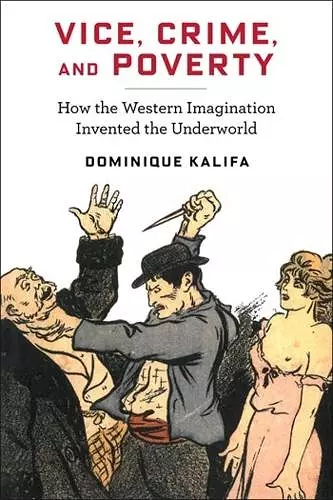Vice, Crime, and Poverty
How the Western Imagination Invented the Underworld
Dominique Kalifa author Susan Emanuel translator
Format:Paperback
Publisher:Columbia University Press
Published:14th Dec '21
Should be back in stock very soon

Beggars, outcasts, urchins, waifs, prostitutes, criminals, convicts, madmen, fallen women, lunatics, degenerates—part reality, part fantasy, these are the grotesque faces that populate the underworld, the dark inverse of our everyday world. Lurking in the mirror that we hold up to our society, they are our counterparts and our doubles, repelling us and yet offering the tantalizing promise of escape. Although these images testify to undeniable social realities, the sordid lower depths make up a symbolic and social imaginary that reflects our fears and anxieties—as well as our desires.
In Vice, Crime, and Poverty, Dominique Kalifa traces the untold history of the concept of the underworld and its representations in popular culture. He examines how the myth of the lower depths came into being in nineteenth-century Europe, as biblical figures and Christian traditions were adapted for a world turned upside-down by the era of industrialization, democratization, and mass culture. From the Parisian demimonde to Victorian squalor, from the slums of New York to the sewers of Buenos Aires, Kalifa deciphers the making of an image that has cast an enduring spell on its audience. While the social conditions that created that underworld have changed, Vice, Crime, and Poverty shows that, from social-scientific ideas of the underclass to contemporary cinema and steampunk culture, its shadows continue to haunt us.
Dominique Kalifa is one of the best French cultural historians of his generation and a worthy successor to Alain Corbin at the Sorbonne. Vice, Crime, and Poverty examines the urban ‘underworld,’ not in the twentieth-century sense of organized crime but as an imaginary shaped discursively in the nineteenth century by a widespread if morbid fascination with the apparent dangers of urban life. -- Edward Berenson, author of Europe in the Modern World
This is a lively and fun read. More than tracing the evolution of living conditions of the poor and indigent, Vice, Crime, and Poverty also represents an important contribution to the histoire des mentalités, telling us how different eras viewed the poor in terms of social changes at those times. The transnational aspect greatly enhances this study, making it a significant contribution to the field by offering insights into both European and American history. -- Venita Datta, author of Heroes and Legends of Fin-de-Siècle France: Gender, Politics, and National Identity
Kalifa is the leading historian still teaching and writing about modern French history in France. In Vice, Crime, and Poverty, he shows how the lowest of the lower classes came to be represented by, or analogized with, indigenous colonized peoples. He offers interesting reflections on the successors of the inhabitants of the bas-fonds and the emergence of new designations for them, along with the internationalization of crime. Yet again, Kalifa provides much to discuss. -- John Merriman, author of Ballad of the Anarchist Bandits: The Crime Spree that Gripped Belle Epoque Paris
Kalifa’s research is virtuosic, incorporating every type of source under the sun—poetry, sociology, films, popular songs, literature, journalism—and is endlessly entertaining. -- Hadley Suter * Los Angeles Review of Books *
An expertly drawn picture of a lost myth. . . . This accessible work should find ready use in the classroom and among a wide readership . . . interested in urban history, class, and nineteenth-century culture. * American Historical Review *
A rich book. . . . Kalifa makes the case for the abundant possibilities in study of the social imaginary. * Journal of Social History *
Kalifa extensively catalogs the language, imagery, and discursive forms in which the underworld has been evoked over time. * Journal of Modern History *
In theory, we've left those ideas behind. In practice, the poor, the mentally ill, and those classified as deviant are all still seen too often as a single stigmatized mass, to be cured, saved, policed, condescended to, and enjoyed as lurid entertainment by those who consider themselves their social superiors. * Pacific Standard *
A blurring of any distinction between the place and the population runs throughout the texts Kalifa draws on, which include novels, police memoirs, newspaper articles by undercover reporters and pleas by social reformers. * Inside Higher Ed *
The breadth of insights contained in Vice, Crime, and Poverty is breathtaking. . . . Engaging, methodologically sophisticated, and thought-provoking. * H-France *
Colorfully written, jargon free, and nicely translated, this volume suggests that every generation gets the underworld it needs. * Choice *
Beautiful book, rich of literature, anecdotes, stories. . . . Highly recommended. * Al Femminile *
Kalifa insightfully demonstrates how languages and vocabularies originating in the descriptions of the underworld by nineteenth-century contemporaries created inaccurate, misinformed, exaggerated, and sensationalized images of the poor and socially marginal. * Labor *
- Winner of Choice Outstanding Academic Title 2019
ISBN: 9780231187435
Dimensions: unknown
Weight: unknown
296 pages